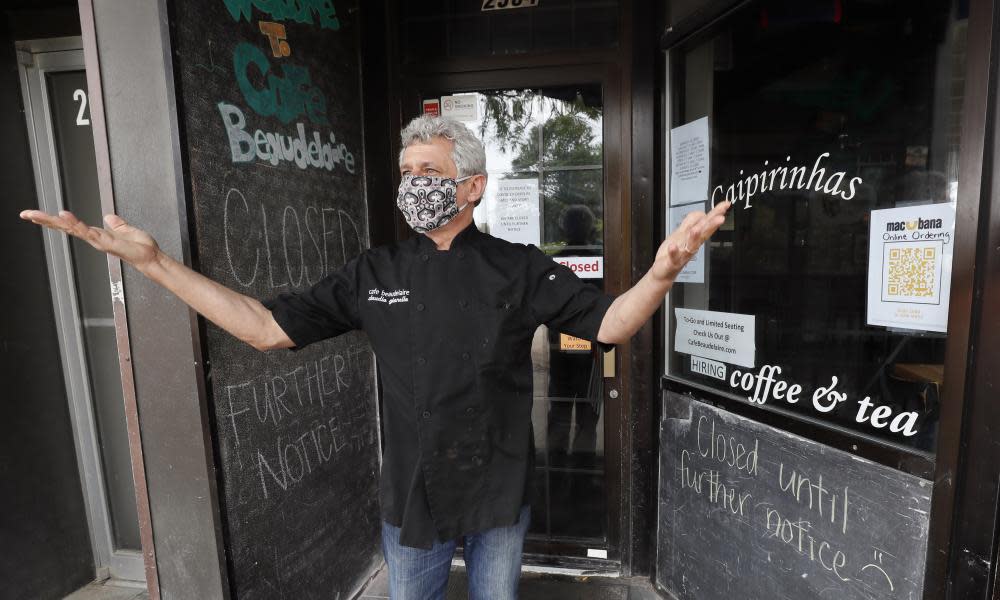Iowa refuses to close bars and require masks as Covid-19 cases surge in cities

Iowa’s governor, Kim Reynolds, is refusing to enforce a White House coronavirus taskforce recommendation to close bars and require people to wear masks after Covid-19 infections in some of the state’s cities surged.
Meanwhile, coronavirus cases have risen sharply across the whole midwest in recent weeks putting the region at the forefront of America’s pandemic. The region accounted for six of the eight states with the highest number of new Covid-19 cases by early September even as infections fell in other parts of the US previously among the worst hit.
North Dakota has the largest number of positive cases per capita in the country over the past 14 days. Iowa and South Dakota are enduring the highest percentage increases. Missouri has seen more than 1,300 new cases a day on average over the past week.
Related: Covid-19 death rate among African Americans and Latinos rising sharply
In Iowa, the increase was centered on university towns following the return of students to classes. By late August, two of the state’s cities, Ames and Iowa City, were enduring the worst coronavirus surges in the country. The per capita infection rates were higher than any individual country.
Amid warnings that the failure to enforce masks and social distancing was likely to cost hundreds of additional lives in the coming months, the White House taskforce said in a report on 31 August that bars “must be closed” in 61 of Iowa’s 99 counties and seating in restaurants should be limited. It also recommended restrictions on the size of gatherings in the worst hit counties along with the closure of gyms.
“Community transmission continues to be high in rural and urban counties across Iowa, with increasing transmission in the major university towns,” the report warned. “Mask mandates across the state must be in place to decrease transmission.”
But Reynolds has limited bar closures to six counties including those with the universities. She would go no further than “strongly encouraging” people to wear masks, saying that they were “not a silver bullet”.
“I still believe it’s up to the governors in the various states to make those decisions,” the governor said.
Missouri’s governor, Mike Parson, has also consistently resisted making masks obligatory in public spaces, instead issuing guidelines recommending their use while questioning their effectiveness. Authorities in the state’s major cities, including St Louis and Kansas City, have imposed their own mandatory requirements.
In July, Anthony Fauci, the president’s lead coronavirus expert, urged the midwest’s political leaders to follow the science by warning that the region should learn from the surge in cases in southern states during the summer.
The University of Washington’s Institute of Health Metrics and Evaluation has predicted that without mandatory masks, the number of daily coronavirus deaths in Iowa will be six times higher than if 95% of people used face coverings.
Reynolds blamed “social activity among young adults” for driving the rise in coronavirus numbers. The White House task force warned that university towns need to routinely test all students “to immediately identify new cases and outbreaks and isolate and quarantine”.
Students at the University of Iowa have demanded testing after nearly 1,600 cases have been self-reported on the campus since 18 August but the university has resisted.
“Our numbers are clearly terrifying,” an associate professor, Naomi Greyser, told CNN. “They’re really scary and my students are scared.”
In the counties around Iowa City and Ames well above half of all of those tested for Covid-19 were positive for the virus.
Reynolds also backed plans by Iowa State University to allow 25,000 spectators to attend its first college football home game of the season this week. The university reversed the decision after strong criticism.
Coronavirus policy in the midwest has become closely bound up with politics with even prominent politicians buying into conspiracy theories.
The US senator for Iowa, Joni Ernst, speculated that doctors were exaggerating the fatalities by falsely pinning deaths from other causes on Covid-19. Ernst, a Republican facing a close race for re-election, picked up on a conspiracy theory that misinterprets official statistics to say she was “so sceptical” about the official coronavirus death toll.
“These healthcare providers and others are reimbursed at a higher rate if Covid is tied to it, so what do you think they’re doing?” she said, according to the Waterloo-Cedar Falls Courier.
The Iowa Medical Society called Ernst’s comments “incredibly disappointing”.
“Now is not the time to spread mistruths and distrust. We must work together to keep Iowans safe and healthy,” it said.

